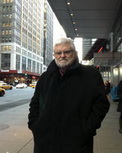 Chris
McDonnell, UK
Chris
McDonnell, UKchristymac733@gmail.com
 Chris
McDonnell, UK
Chris
McDonnell, UK
christymac733@gmail.com
Previous articles by Chris Comments welcome here
April
18, 2018
A question of doubt
Alexander Fleming discovered
the world’s first antibiotic, by accident on 28th September 1928.
His curiosity led him to question why something had happened that he
didn’t expect. At the time he was working in London, at St Mary’s
Hospital Paddington. After a few days away, he returned to find that on
the petri dishes he had left stacked up in his laboratory there was
indication of a bacteria-destroying mould. His curiosity, his questioning,
led to the discovering of the life-saving drug we now know as penicillin.
Doubt and curiosity are part of the same story they come from the same mind-mould that asks questions, that is not satisfied with the easy option. Peter Abelard (1079-1142) wrote that "By doubting we are led to question, by questioning we arrive at truth"
One of the central stories of the post-Resurrection events is the absence of Thomas from the gathered disciples when the Lord came into their presence. His doubt over the truth of their story led him to seek proof, to demand, in some tangible form, evidence of what his common sense told him was impossible. When the Lord gave him that opportunity, he also gave us the essence of faith. "Blessed are those who have not seen, yet have believed".
I have always felt a great deal of sympathy and understanding for Thomas. He was not a man to be strung along by hearsay. Yet when confronted by the Risen Christ his acceptance is total ‘My Lord and my God’
Faith and doubt are part of the same story. To have faith without doubt is to expect certainty. That’s not what it is about, that is not it all. The Gospel narratives are a continual message of a gift on offer, a gift that may be accepted or rejected, an understanding that the decision is an open one, it is up to us.
Once we have accepted that doubt is part of faith, our expectation of an easy ride is reduced and trust is maintained in times of difficulty.
Doubt is very much part of the scientific challenge. A scientist must be willing to have his theories tested by others qualified to make judgement. Such peer evaluation is important. The physicist Richard Feynman stressed that the easiest person to fool is oneself. Doubt is also important to non-scientists. It’s good to be sceptical, especially about ideas you learn from authority figures.
We live in a time when ‘fake news’ has become the convenient label attached to media reports that some don’t like. It is an easy, throw-away term that clouds clear thinking. That is not to say that we should accept everything at face value; of course questions should be asked and the veracity of arguments challenged. Who said it? Why was it said? Who will gain from publication? And so much more.
Misinterpretation, whether accidental or deliberate, can easily arise when a media story is taken up in an uncritical manner. The web blogs, social media and newsprint have had a field day over the reported exchange between Pope Francis and an Italian journalist, Eugenio Scalfari, co-founder and former editor of La Repubblica, on the question of the existence of Hell. The reports say that he denied its existence. I am sure his answer was a good deal more nuanced than that. His response in 2015 to a question put to him by a female scout is telling. "If God forgives everyone, why does hell exist?" she asked. Francis acknowledged that this was a "good and difficult question."
Our difficulties arise when we fail to take up a challenge that is posed by circumstances and events. Sometimes the honest answer to doubt is a degree of humility with the response ‘I just don’t know’. Children are good at asking questions. The trouble is that they always seem to expect answers from the grown-ups. But their willingness to ask questions is at the core of honest education. A good teacher is not one who imparts facts and information for general consumption, but someone who encourages a young person to appreciate life by questioning the experience.
So the challenge of doubt, when what we hold to be true is tested by new circumstances and the challenge of new information, should be accepted as part of the story. When Michael Faraday demonstrated the electric motor at the Royal Institution in the mid 19th Century, a member of his audience asked a simple question ‘But what use will it be?’ His reply was succinct and well worth remembering ‘Can you tell me the use of a newborn child?’
Our doubts can lead to trust just as the odd cul-de-sac on a journey is not the end of the story but each diversion is a learning point on the way.
END
====